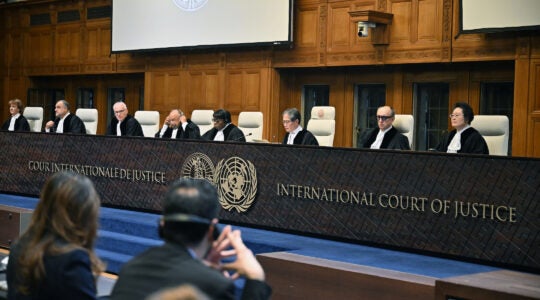WASHINGTON (JTA) – Once again, the best advocate for getting tough with Iran may be Iran itself.Not for the first time, Mahmoud Ahmadinejad’s timing has been exquisite: Just as President Bush was getting ready to make the case to a nervous European continent for a missile defense system targeting Iran, the Iranian president seemed to lay out the case for why he is a threat.”The countdown button for the destruction of the Zionist regime has been pushed by the hands of the children of Lebanon and Palestine,” he said in a speech on Sunday.That helped drive the U.S. missile plans out of the headlines for a while at least and drew European opprobrium.”Such remarks are incompatible with the dialogue between cultures and civilizations to which we are committed, and with Iran’s aspiration to play a regional role of primary importance,” said Bernard Kouchner, the French foreign minister, in a statement released through his embassy in Washington.More broadly, Europe is frustrated by Iran’s forging ahead with its enrichment of uranium, raising the possibility that the U.N. Security Council will expand sanctions for the third time since December.Iran shrugged last month when a surprise visit by inspectors from the U.N.’s International Atomic Energy Agency found 1,600 working centrifuges at its reactor in Natanz.”They should be aware that Iran is a big country,” Ahmadinejad was quoted by Reuters as telling foreign journalists in Tehran. “Some say Iran is like a lion sitting calmly in the corner. We advise them not to play with a lion’s tail.”Iran insists its program is peaceful, but IAEA inspectors believe it is on a course to make nuclear weapons.The United States is ready to push ahead with new U.N. Security Council sanctions, Stephen Hadley, Bush’s national security adviser, said ahead of the president’s attendance this week in Berlin at the G-8 summit of major industrial nations.”Iran has yet again defied the request of the international community embodied in the second U.N. Security Council resolution, and that raises the prospect of a third resolution in order to increase pressure on Iran and get it to understand that the international community is serious that it needs to suspend its enrichment program,” Hadley said.Russia, bridling at the placement of the U.S. missile interceptors in Europe, is nonetheless increasingly concerned about Iran’s nuclear capacity, according to an analysis by Emanuele Ottolenghi published by the Washington Institute for Near East Policy. Ottolenghi, executive director of the American Jewish Committee’s Transatlantic Institute in Brussels, quoted diplomats at a recent Luxembourg conference on nuclear disarmament as discerning a “new and more concerned tone in Russia’s language, indicating that consensus on halting Iran’s enrichment efforts is not faltering despite continued Iranian noncompliance.”Hadley urged Iran to return to negotiations based on a European Union proposal that would allow Iran access to uranium enriched in another country.”We think it’s in the interest of the Iranian people for their government to accept that proposal and come back into the negotiations,” he said.That proposal is also embodied in a resolution circulating through the U.S. House of Representatives sponsored by Rep. Tom Lantos (D-Calif.), the chairman of the House’s foreign affairs committee. Lantos, who is Jewish, has a carrot-and-stick approach on Iran. He has signed a majority of House members onto another bill that would close loopholes in current U.S. sanctions against Iran by extending them to subsidiaries of U.S. companies and tightening the president’s ability to waive the legislation. A similar bill is under consideration in the Senate, and insiders say the sanctions bills will likely be considered over the summer.Meanwhile, Florida this week will become the first state to divest its pensions from companies that deal with Iran, with about a dozen other states expected to follow soon. Bills initiated by Rep. Barney Frank (D-Mass.) and Sen. Barack Obama (D-Ill.) circulating through Congress would facilitate such state divestments by listing U.S. companies that deal with Iran.Ephraim Sneh, Israel’s deputy defense minister, said that any new sanctions should hit distilled petroleum exports to the Islamic Republic.”Real sanctions are the best way to urge the Iranian regime to change its plans and even more than that drive a wedge between the Iranian people and the Iranian ayatollahs’ regime,” he told JTA during a conference call organized by the Israel Policy Forum.”There is one very, very effective sanction, and this is an embargo on the export of oil distillates, mainly gasoline for cars to Iran. Iran is the fourth largest exporter, but they have to import half their consumption.”
JTA has documented Jewish history in real-time for over a century. Keep our journalism strong by joining us in supporting independent, award-winning reporting.





